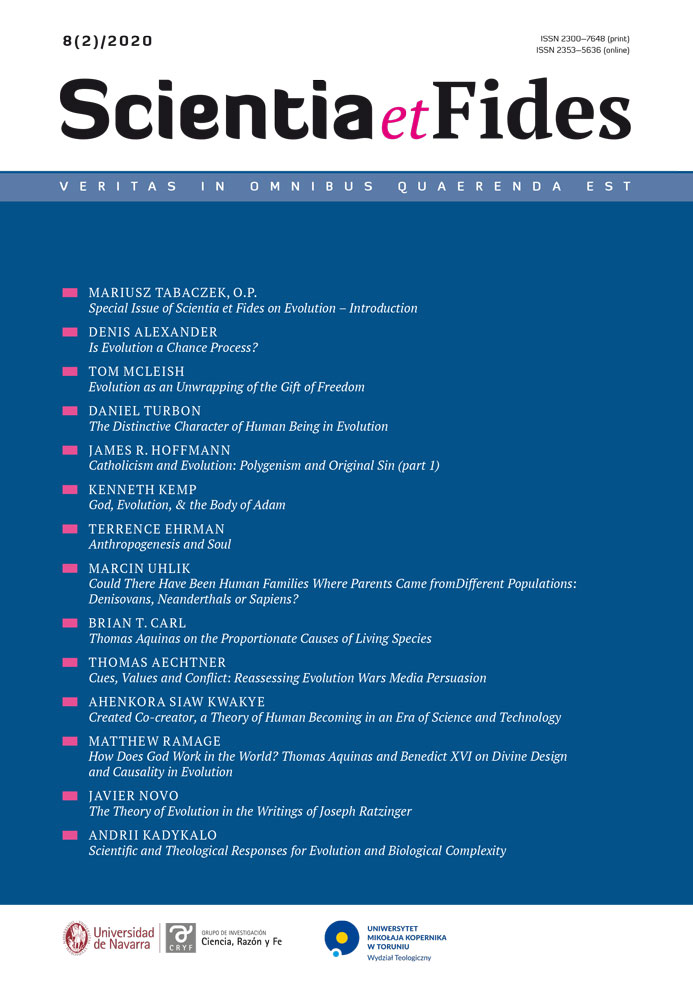Thomas Aquinas on the Proportionate Causes of Living Species
DOI :
https://doi.org/10.12775/SetF.2020.020Mots-clés
Thomas Aquinas, Aristotle, metaphysics, evolution, proportionate causality, spontaneous generationRésumé
The principle of proportionate causality is often cited as a cause for concern that Thomistic metaphysics may be irreconcilable with a theory of biological evolution. St. Thomas does hold that for the generation of what he calls perfect animals, a generator of the same species is required. This study clarifies what the proportionate causes of generated organisms are for Thomas, examining his views about spontaneous generation, reproductive generation, and hybridization, while also articulating the roles of both the heavenly bodies and their separate movers as universal causes of generation. This study establishes that Thomas’s assertion of the need for a univocal generator for perfect animals is grounded not in the principle of proportionate causality, but rather in physical and biological doctrines received from Aristotle and in a causal principle that seems reconcilable with biological evolution, namely, that a remote universal cause requires more mediating causes to produce more powerful effects.
Références
Primary Sources
Aquinas, Thomas. Sancti Thomae Aquinatis Opera omnia. Leonine edition. Rome: Ex Typographia Polyglotta S.C. de Propaganda Fide, 1882–.
Aquinas, Thomas. In duodecim libros Metaphysicorum Aristotelis expositio. Ed. M. R. Cathala and R. M. Spiazzi. Marietti: Turin-Rome, 1971.
Aquinas, Thomas. Quaestiones disputatae. Vol. 2. Ed. M. Pession. Marietti: Turin-Rome, 1965.
Aquinas, Thomas. Scriptum super libros Sententiarum magistri Petri Lombardi. 4 vols. 1–2, ed. R.P. Mandonnet; 3–4, ed. M. F. Moos. Paris: Lethielleux, 1929–47.
Aquinas, Thomas. Summa contra Gentiles. Leonine Manual Edition. Rome: Leonine Commission, 1934.
Aristotle. The Complete Works of Aristotle. Ed. Jonathan Barnes. Princeton: Princeton University Press, 1984.
Secondary Sources
Brown, Christopher M, 2007. “Artifacts, Substances, and Transubstantiation: Solving a Puzzle for Aquinas’s Views,” The Thomist 71.1: 89-112.
Chaberek, Michael. 2017. Aquinas on Evolution. Leicester: The Chartwell Press.
Chaberek, Michael. 2019. “Classical Metaphysics and Theistic Evolution: Why are They Incompatible?” Studia Gilsoniana 8.1: 47-81.
Cory, Therese Scarpelli. 2018. “Is Anything in the Intellect that Was Not First in Sense? Empiricism and Knowledge of the Incorporeal in Aquinas,” Oxford Studies in Medieval Philosophy 6: 100-143.
Feser, Ed. 2017. Five Proofs for the Existence of God. San Francisco: Ignatius Press.
Klubertanz, George P., 1941. “Causality and Evolution,” The Modern Schoolman 19.1: 11-14.
Marmodoro, Anna, and Page, Ben, 2016. “Aquinas on Forms, Substances, and Artifacts,” Vivarium 54.1: 1-21.
McInerny, Ralph. 2006. The Prudence of the Flesh. New York: St. Martin’s Press.
Lehoux, Daryn. 2017. Creatures Born of Mud and Slime. Baltimore: Johns Hopkins University Press.
Lennox, James. 2001. “Aristotle’s Theory of Spontaneous Generation.” In Aristotle’s Philosophy of Biology, 229-49. Cambridge: Cambridge University Press.
Rota, Michael, 2004. “Substance and Artifact in Thomas Aquinas,” History of Philosophy Quarterly 21.3: 241-59.
Téléchargements
Publiée
Comment citer
Numéro
Rubrique
Licence
© Scientia et Fides 2020

Ce travail est disponible sous licence Creative Commons Attribution - Pas de Modification 4.0 International.
CC BY ND 4.0. The Creator/Contributor is the Licensor, who grants the Licensee a non-exclusive license to use the Work on the fields indicated in the License Agreement.
- The Licensor grants the Licensee a non-exclusive license to use the Work/related rights item specified in § 1 within the following fields: a) recording of Work/related rights item; b) reproduction (multiplication) of Work/related rights item in print and digital technology (e-book, audiobook); c) placing the copies of the multiplied Work/related rights item on the market; d) entering the Work/related rights item to computer memory; e) distribution of the work in electronic version in the open access form on the basis of Creative Commons license (CC BY-ND 3.0) via the digital platform of the Nicolaus Copernicus University Press and file repository of the Nicolaus Copernicus University.
- Usage of the recorded Work by the Licensee within the above fields is not restricted by time, numbers or territory.
- The Licensor grants the license for the Work/related rights item to the Licensee free of charge and for an unspecified period of time.
FULL TEXT License Agreement
Stats
Number of views and downloads: 1932
Number of citations: 2



